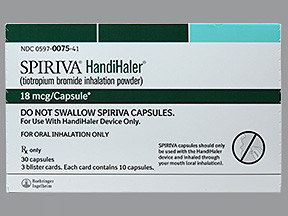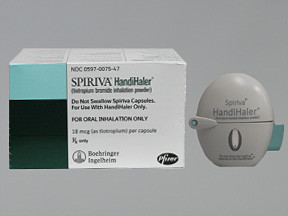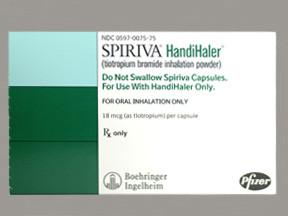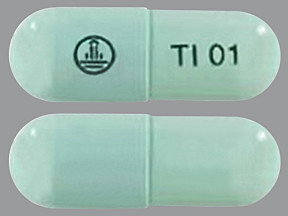TIOTROPIUM POWDER IN CAPSULE - INHALATION
PHONETIC PRONUNCIATION: (TYE-oh-TROE-pee-um)
COMMON BRAND NAME(S): Spiriva
GENERIC NAME(S): tiotropium bromide
Uses
USES: Tiotropium is used to control and prevent symptoms (such as wheezing, shortness of breath) caused by ongoing lung disease (chronic obstructive pulmonary disease-COPD which includes bronchitis and emphysema). It works by relaxing the muscles around the airways so that they open up and you can breathe more easily. Tiotropium belongs to a class of drugs known as anticholinergics. Controlling symptoms of breathing problems can decrease time lost from work or school. This medication must be used regularly to be effective. It does not work right away and should not be used to relieve sudden breathing problems. If wheezing or sudden shortness of breath occurs, use your quick-relief inhaler (such as albuterol, also called salbutamol in some countries) as prescribed.
How to use TIOTROPIUM POWDER IN CAPSULE - INHALATION
HOW TO USE: Read the Patient Information Leaflet and instruction sheet if available from your pharmacist before you start using tiotropium and each time you get a refill. Learn how to use this inhaler properly. If you have any questions, ask your doctor or pharmacist. Do not swallow these capsules by mouth. Use the special inhaler to inhale the powder in the capsules. Inhale this medication by mouth as directed by your doctor, usually once daily. Inhale 2 times per capsule to make sure you inhale all of the drug. Do not breathe out into the mouthpiece at any time. Avoid getting this medication into your eyes. It may cause eye pain/irritation, temporary blurred vision, and other vision changes. If you are using other inhalers at the same time, wait at least 1 minute between the use of each medication. Use this medication regularly in order to get the most benefit from it. This medication works best if used at evenly spaced intervals. To help you remember, use it at the same time each day. Do not increase your dose, use this medication more frequently, or stop using it without first consulting your doctor. Rinse your mouth after using the inhaler to prevent dry mouth and throat irritation. Clean the inhaler at least once a month with water. Allow to air-dry fully before using again. Learn which of your inhalers you should use every day and which you should use if your breathing suddenly worsens (quick-relief drugs). Ask your doctor ahead of time what you should do if you have new or worsening cough or shortness of breath, wheezing, increased sputum, waking up at night with trouble breathing, if you use your quick-relief inhaler more often, or if your quick-relief inhaler does not seem to be working well. Learn when you can treat sudden breathing problems by yourself and when you must get medical help right away. Tell your doctor if your symptoms do not improve or if they worsen.
Side Effects
Precautions
Interactions
Overdose
Images

- color
- light green
- shape
- oblong
- imprint
- TI 01, logo

- color
- light green
- shape
- oblong
- imprint
- TI 01, logo

- color
- light green
- shape
- oblong
- imprint
- TI 01, logo

- color
- light green
- shape
- oblong
- imprint
- TI 01, logo
Reviews
Faq for TIOTROPIUM POWDER IN CAPSULE - INHALATION
Tiotropium powder in capsule inhalation is used to treat chronic obstructive pulmonary disease (COPD), including chronic bronchitis and emphysema. It helps to control and prevent symptoms such as shortness of breath, wheezing, and coughing.
Tiotropium powder in capsule inhalation belongs to a class of medications called anticholinergics. It works by relaxing and opening the airways in the lungs, making it easier to breathe.
The usual recommended dosage is one inhalation daily, administered at the same time each day. It is important to follow the instructions provided by your healthcare provider.
Common side effects may include dry mouth, constipation, blurred vision, and urinary retention. However, not everyone experiences these side effects. It is essential to discuss any concerns with your doctor.
Tiotropium powder in capsule inhalation is not meant to be used as a rescue medication during an asthma attack. It is intended as a long-term maintenance treatment for COPD. Always carry a separate rescue inhaler prescribed by your doctor for asthma attacks.
Tiotropium powder in capsule inhalation may start to improve lung function within 30 minutes of the first dose, but it may take several weeks to experience the full benefits. Consistent daily use is important for optimal results.
Tiotropium powder in capsule inhalation is generally not recommended for children below the age of 1
It is crucial to inform your doctor about all medications you are currently taking, including prescription, over-the-counter, and herbal supplements. They can determine if any potential drug interactions may occur.
There is limited information available about the safety of tiotropium powder in capsule inhalation during pregnancy or breastfeeding. It is essential to consult with a healthcare professional to discuss the potential risks and benefits.
Disclaimer
IMPORTANT: HOW TO USE THIS INFORMATION: This is a summary and does NOT have all possible information about this product. This information does not assure that this product is safe, effective, or appropriate for you. This information is not individual medical advice and does not substitute for the advice of your health care professional. Always ask your health care professional for complete information about this product and your specific health needs.
No Reviews Yet